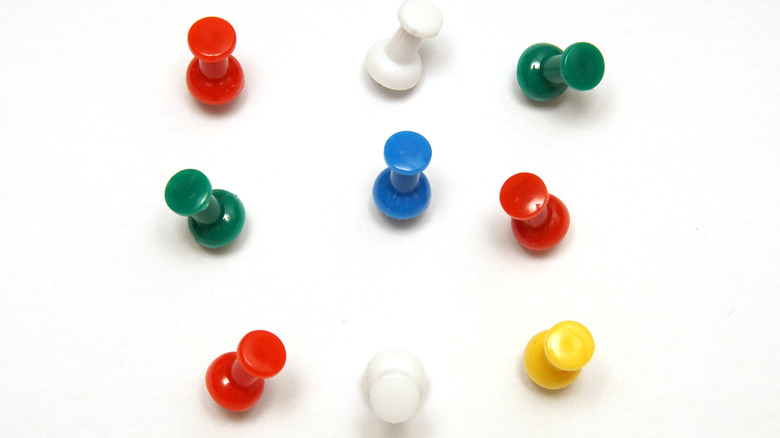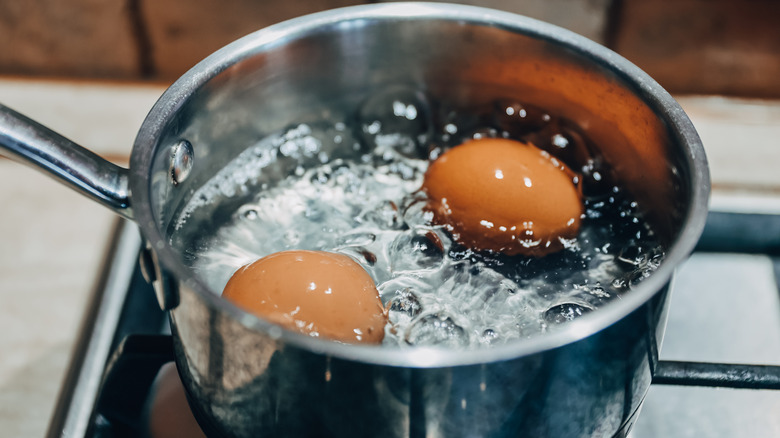Jacques Pépin's Thumbtack Hack For Peeling Hard-Boiled Eggs
When it comes to everyday French cooking, Jacques Pépin has a dignified hack or useful tip for just about everything. Take his method of testing his kitchen knives by slicing a tomato; his frugal habit of getting the most out of asparagus stalks by peeling them into strips; or his playful trick for checking an egg's doneness by spinning it on the counter.
Speaking of boiled eggs, Pépin predictably knows the secret to hassle-free peeling. It involves sticking a thumb tack or pin through the shell of a raw egg before boiling. As he explains in his book "Essential Pépin" and demonstrates in an episode of his KQED series "Cooking at Home," poking a sharp object into the rounded bottom part of the egg (which contains a small pocket of air) relieves the pressure that can build up as it boils in water. This protects the egg from cracking as it cooks and saves you from rubbery whites. It also loosens the egg from its shell, making peeling a breeze.
Take the pressure off
Jacques Pépin isn't the only pro who advocates for sticking pins in your eggs. Celebrity chef Jet Tila showcases the same trick in a TikTok video to great success, only he uses a safety pin instead of a thumb tack. "The egg is actually more durable than you know," Tila says to those afraid of cracking the shell. Likewise, Lifehacker tested the Pépin method and determined that the pinned eggs were easier to peel. Poking the eggs at the round end, where that air pocket is (as opposed to the pointy end) is crucial, though. When Lifehacker tried the latter, the eggs turned out warped.
Pépin's boiled egg tips don't stop at office supplies, however. If you're overwhelmed by the internet's contradictory arsenal of advice on the best ways to achieve perfect boiled eggs, make it easy on yourself by diving full tilt into the French chef's instructions. For instance, instead of cooking eggs at a rapid boil or off the heat entirely, Pépin favors a gentle boil to keep the whites from getting tough. As for timing, he lets hard-boiled eggs go for 10 minutes and takes out his soft-boiled eggs, or egg mollet, after seven minutes. Finally, to prevent that unsavory greenish ring of sulfur from forming around the yolk of his hard-boiled eggs, he transfers them to ice-cold water. "The sulfur will feel the cold across the egg white and dissipate in the water," he says.
Eggs any time
For Jacques Pépin, eggs aren't just a protein-filled snack or a breakfast food. "When we were kids, eggs were a staple on our table," he told PBS. "Eggs were always a welcome main dish, especially in a gratin with béchamel sauce and cheese, and we loved them in omelets with herbs and potatoes that Maman would serve hot or cold with a garlicky salad."
One could honor Pépin's French background and boiled egg method by throwing together a classic niçoise salad, but it would be more fun to pay homage to one of his prized family recipes: Les oeufs Jeannette, or "eggs Jeannette," a stuffed egg dish that he serves "as a first course or as a main course for lunch."
Much like deviled eggs, the process involves splitting boiled eggs down the center, removing the yolks, mixing them with other ingredients, and spooning them back into the whites. In this case, those additional ingredients include garlic, parsley, milk, salt, and pepper. The stuffed eggs are kissed with heat in a skillet, though we imagine a broiler would also lend a nice golden-brown hue. As a final touch, the eggs are drizzled in a simple Dijon dressing.


